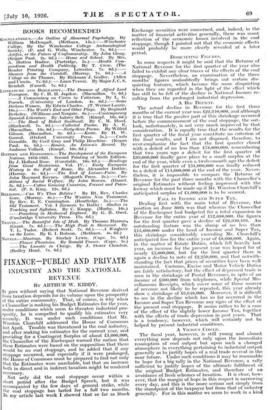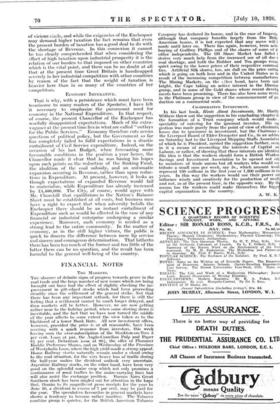FINANCE-P1JBLIC AND PRIVATE
INDUSTRY AND THE NATIONAL REVENUE
BY ARTHUR W. KIDDY.
IT goes without saying that National Revenue derived from taxation depends for its volume upon the prosperity of the entire community. That, of course, is why when a Chancellor is making his Budget Estimates for the year, under conditions which seem to threaten industrial pro- sperity, he is compelled to qualify his estimates very severely. It was under such conditions that Mr. Winston Churchill addressed the House of Commons last April. Trouble was threatened in the coal industry, and after making his estimates for the current year, and providing for a Contingent Surplus of about £4,000,000, the Chancellor of the Exchequer warned the nation that these Estimates were based on the supposition that there would be no coal stoppage, and he added that if any stoppage occurred, and especially if it were prolonged, the House of Commons must be prepared to find not only that the Estimates were unreliable, but that an increase both in direct and in indirect taxation might be rendered necessary. Not only did the coal stoppage occur within a short period after the Budget Speech, but it was accompanied by the few days of general strike, while the coal stoppage has lasted for a full two months. In my article last week I showed that so far as Stock Exchange securities were concerned, and, indeed, in the matter of financial activities generally, there was scant reflection of the economic lossea. involved - in the .coal stoppage,.though_I pointed out that the economic effects would probably he more clearly revealed at a later period.
DISQUIETING FIGURES.
In some respects it might be said that the Returns of National Revenue for the first quarter of the year also failed to exhibit any clear traces of the effects of the coal stoppage. Nevertheless, an examination of the three months' figures undoubtedly brings out certain dis- quieting features, which become the more disquieting when they are regarded in the light of the effect which has still to be felt of the decline in National Income re- sulting from the prolonged industrial depression.
A BIG DEFICIT.
The actual decline in Revenue for the first three months of the current year was £22,340,000, and although it is true that the greater part of this shrinkage occurred before the commencement of the coal stoppage, the out- look, unfortunately, is not very much improved by that consideration. It is equally true that the results for the first quarter of the fiscal year constitute no criterion of the final results, and I am not disposed, therefore, to over-emphasize the fact that the first quarter closed with a deficit of no less than £78,000,000, remembering that two years -ago a deficit for the first quarter of £39,000,000 finally gave place to a small surplus at the end of the year, while even a twelvemonth ago the deficit for the first quarter of £51,000,000 was finally reduced to a deficit of 114,000,000 at the end of the year. Never- theless, it is impossible to compare the Returns of Revenue for the past three months with the Chancellor's original Estimates without feeling impressed with the leeway which must be made up if Mr. Winston Churchill's anticipated surplus of 14,000,000 is to be secured.
FALL IN INCOME AND SUPER TAX.
Dealing first with the main total of Revenue, the position on June 30th was that whereas the Chancellor of the Exchequer had budgeted for a total expansion in Revenue for the entire year of £12,688,000, the figures for the first quarter gave a decline of £22,340,416. An outstanding feature was the slump of no less than £15,600,000 under the head of Income and Super Tax, this shrinkage considerably exceeding Mr. Churchill's anticipated loss for the entire year of £8,600,000. Again, in the matter of Estate Duties, which fell heavily last year, an increase for the present year was hoped for of nearly £5,000,000, but for the first quarter there is again a decline to note of £2,250,000, and that notwith- standing the fact that prices of securities have been well maintained. Customs, Excise and Motor Vehicle Duties are fairly satisfactory, but the effect of depressed trade is seen in the shrinkage of Postal Revenues, in spite of an income of £300,000 from telephones, while Special Mis- cellaneous Receipts, which cover some of those sources of revenue not likely to be repeated, this year already show a shrinkage of £6,648,000. Moreover, it is difficult to see in the decline which has so far occurred in the Income and Super Tax Revenue any signs of the effect of the present coal stoppage. It seems rather to be a case of the effect of the slightly lower Income Tax, together with the effects of trade depression in past years. That is a tendency, however, which will certainly not be helped by present industrial conditions.
A VICIOUS. CIRCLE.
The fiscal year, however, is still young and almost everything now depends not only upon the immediate resumption of coal output but upon such a changed atmosphere in everything pertaining to industrial output generally as to justify hopes of a real trade revival in the near future. Under such conditions it may be reasonable to hope for a big rally in the National Revenue, a rally sufficient to justify hopes of the ultimate fulfilment of the original Budget Estimates, and therefore of an avoidance of fresh schemes of taxation. It is clear, how- ever, that the margin of hope in this respect is narrowing every day, and this is the more serious not simply from the standpoint of the taxpayer but from that of industry generally. For in this matter we seem to work in a kind of vicious circle, and while the exigencies of the Exchequer may demand higher taxation the fact remains that even the present burden of taxation has a good deal to do with the shortage of Revenue. In this connexion it cannot be too clearly comprehended that when considering the effect of high taxation upon industrial prosperity it is the relation of our burden to that imposed on other countries which is the vital point, and there can be no doubt at all that at the present time Great Britain is handicapped severely in her industrial competition with other countries by reason of the fact that the weight- of .taxation is heavier here than in so many of the countries of her competitors.
ECONOMY IMPERATIVE.
That is why, with a persistence which must have been wearisome to many readers of the Spectator, I have felt it necessary to emphasize the paramount need for economy in the National Expenditure. In that respect, of course, the present Chancellor of the Exchequer has woefully disappointed expectations. Much of the extra- vagance at the present time lies in what are called "outlays for the Public Services." Economy therefore cuts across questions of political policy, but the Government so far has completely failed to fulfil expectations in a drastic curtailment of Civil Service expenditure. Indeed, on the occasion of his last Budget, when forecasting more favourable conditions in the position. a year hence, the Chancellor made it clear that he was basing his hopes upon such points as the reduction of the Sinking Fund, the abolition of the coal subsidy, and an automatic expansion oecuring in Revenue, rather than upon reduc- tions in Expenditure. At present, however, it looks as though expectations of expanded Revenue would fail to materialize, while Expenditure has already increased by 14,400,000. The City, of course, would agree with Mr. Churchill that equilibrium in the Nation's Balance Sheet must be established at all costs, but business men have a right to expect that when adversity befalls the Exchequer there should be an instant curtailment of Expenditure such as would be effected in the case of any financial or industrial enterprise undergoing a similar experience. Moreover, such economy is needed as a strong lead to the entire community. In the matter of economy, as in the still higher virtues, the public is quick to discern the difference between mere lip service and sincere and courageous determination. That hitherto there has been too much of the former and too little of the latter there can be no question, and the result has been harmful to the general well-being of the country.











































 Previous page
Previous page